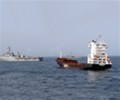

Iran’s targeting of ships in the Gulf of Oman has brought to mind the actions of Somali pirates in Bab al-Mandab that wreaked havoc from 2007 to 2010. Despite the difference in context and goals, the actions are pretty the same with Iranians seeking to threaten international navigation just as Somali pirates did in the past.
On Tuesday, a group of armed men boarded a tanker off the coast of the United Arab Emirates in what appeared to be a “hijacking incident,” according to Omani officials.
The incident, involving eight or nine armed men, ended after the group left the ship on Wednesday morning, according to a statement from the British navy.
Observers believe that the targeting of tankers is part of an Iranian strategy aimed at sending strong messages to Europe, the United States, Israel, as well as the Gulf countries. Iran, the observers argue, wants to demonstrate its ability to threaten the security of international navigation as well as the maritime transport of oil exports.
The piracy incidents are apparently aimed at pressuring the owners of tankers or the countries that benefit from the traffic into making concessions. While Somali pirates were looking for money, the Iranians want to extort political positions in favour of Tehran’s influence, regional role and the country’s nuclear programme.
Piracy off the coast of Somalia which expanded from a threat to international fishing vessels to become a menace to international shipping relied largely on traditional means. Iran’s piracy, however, is supported by the state, which gives the pirates access to sophisticated tools and technologies.
In order to avoid compromising their piracy operations, the Iranians operate in the Gulf of Oman and not in the heavily-guarded Arabian Gulf, where they risk running into confrontation with the US forces.
After boarding and threatening tankers, Iranian pirates usually return to their boats and avoid entering the Iranian territory, unlike Somalis who used to escape in speedboats towards their country’s shores.
Waddah al-Taha, an analyst and a member of the Advisory Board at the Chartered Institute of Securities and Investment, considered that Iran has developed the concept of piracy from that of a criminal act by individuals, militias or gangs to that of “a pirate state”, which calls for international action to counter the phenomenon.
In a statement to The Arab Weekly, Taha noted that “acts of blowing up oil tankers in international waters using sea mines or drones are a method of piracy, and the same applies when tankers are hijacked and forced to change course and travel to Iran.”
On Wednesday, the Oman Maritime Security Centre said in a statement it had received information about the Panama-flagged Asphalt Princess being subjected “to a hijacking incident in international waters in the Gulf of Oman”, but gave no further details.
“The Royal Air Force of Oman is carrying out sorties near the area, and the Royal Navy of Oman deployed several ships to help secure international waters in the region,” it added.
Earlier on Wednesday, the United Kingdom Maritime Trade Operations (UKMTO) said in a warning notice based on a third-party source that people who had boarded the tanker involved in a “potential hijack” had since left and that the vessel, which it did not identify, was safe.
This incident comes after an attack last week on an Israeli-operated tanker off the coast of the Sultanate of Oman, which killed two crew members and was blamed by the United States, Israel and Britain on Iran.
The United States and Britain said they would work with their allies to respond to the attack on the Liberian-flagged tanker Mercer Street, which is owned by a Japanese company and operated by Israel’s Zodiac Maritime.
The Israeli government Wednesday publicly accused an Iranian military officer, Saeed Ara Jani, of overseeing the strike, alleging Ara Jani heads the Revolutionary Guards’ drone unit.
“For the first time ever, I will also expose the man who is directly responsible for the launch of suicide UAVs [unmanned vehicles] — his name is Saeed Ara Jani,” Israeli Defense Minister Benny Gantz said.
“The UAV command conducted the attack on the Mercer Street. Saeed Ara Jani plans and provides the training and equipment to conduct terror attacks in the region,” Gantz added in a briefing to ambassadors from member states of the UN Security Council.
Source: The Arab Weekly